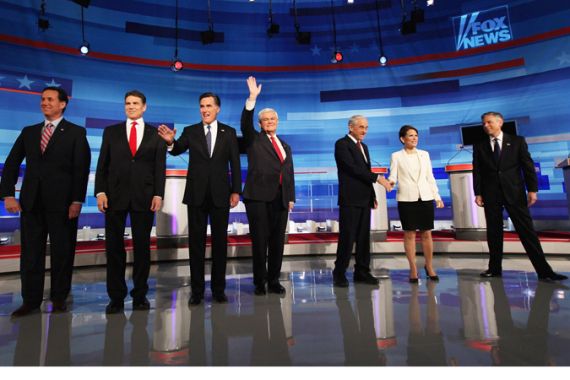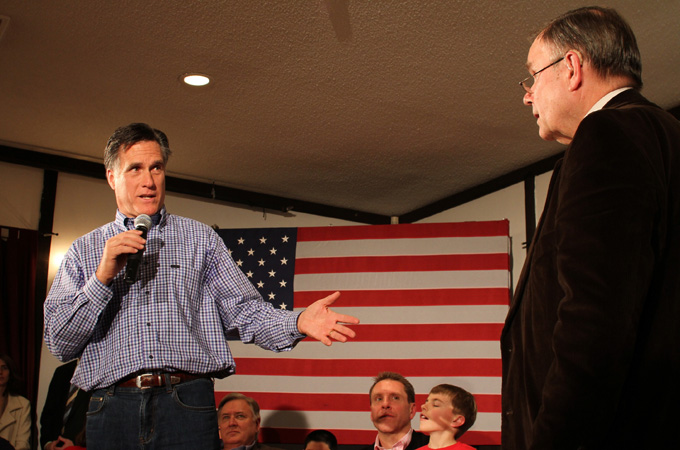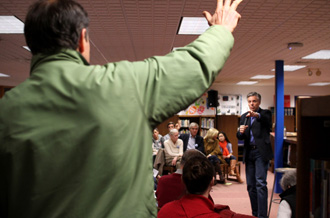Explainer: New Hampshire primary
A look at why the small state’s primary is so important in determining the Republican presidential nominee.

 |
| Former Massachusetts governor Mitt Romney is the strong favourite to win the New Hampshire Republican primary [Thomas Alexander/Al Jazeera] |
Manchester, New Hampshire – New Hampshire, a small state in the northeastern United States, has always been a little different from its neighbours. To its west, the state of Vermont is legendarily progressive: In 2006 it voted into office the US Senate’s first self-proclaimed socialist. And to New Hampshire’s south is Massachusetts, which votes solidly Democratic.
New Hampshire, by contrast, boasts a proudly small-government ethos. There is no state income tax or sales tax. Residents don’t need a permit to openly carry firearms in public. It’s the only state where drivers aren’t required to purchase auto insurance or wear seatbelts. Its political spirit is perhaps best summed up by its automobile licence plates, which boldly proclaim the state motto: “Live Free or Die.”
On January 10, voters in New Hampshire will vote in a primary election for the Republican Party’s presidential nominee. (Democrats will hold a primary, too, but President Obama is running virtually unopposed for his party’s nomination). As a relatively small state, the 12 delegates that New Hampshire apportions to Republican candidates will probably not make a big difference at the party’s convention in August, when it will decide on a presidential nominee. To win the nomination, a candidate needs the votes of at least 1,212 delegates, out of a total of 2,422.
Why is the New Hampshire primary so important, then?
As the first state in the country to hold a primary election (Iowa has historically held the country’s first caucus, a different type of electoral event), New Hampshire wields disproportionate power in determining whom the parties’ presidential nominees will eventually be. Candidates who do poorly in early contests often see their funding dry up, their campaigns ignored, and their polling numbers sag.
The case of former New York City mayor Rudy Giuliani is instructive. Giuliani was leading other Republican presidential contenders in late 2007. But he neglected Iowa and New Hampshire, focusing his attention instead on Florida and other states that held later primaries. Giuliani’s support fell after he finished in sixth place in Iowa and in fourth place in New Hampshire. He dropped out of the race shortly thereafter, having spent a whopping $59m and winning the vote of only a single delegate at the party convention.
A fluke of history
 |
| The New Hampshire primary is known for its ‘retail politics’, in which presidential hopefuls closely interact with state voters [Thomas Alexander/Al Jazeera] |
The major political parties in the US do not hold nationwide primaries to choose their presidential candidates. Instead, all 50 states hold separate contests spread out over several months. New Hampshire, by “pure accident and flukes of history”, in the words of University of New Hampshire Survey Centre director Andrew Smith, has held the first primary in the country since 1920. Today, state law actually requires that its primary be scheduled at least one week earlier than any other primary.
States such as Iowa and New Hampshire have disproportionate clout in choosing party nominees. One study found that voters in early-to-vote states have up to 20 times more influence than people from states that voted later.
Some complain that the current set-up is undemocratic. Certainly, Iowa and New Hampshire are far from representative of the US electorate: The two states are much smaller, more rural, and more heavily white than the rest of the US.
As a result, according to the New York Times, candidates tend to pander to issues specific to these states, and to ignore issues such as urban policy.
An argument can be made, however, that the current system has advantages. For example, Smith notes that New Hampshire is a relatively cheap place to campaign. As a result, he says, candidates “without as much of the national reputation and image still have a chance of campaigning here effectively”.
And because the state is so small, voters can easily attend presidential hopefuls’ campaign events, and interact with the candidates if they so choose. New Hampshire is legendary for its so-called “retail politics”. Bob Bestani, vice-chairman of the Rockingham County Republican Committee, says: “There’s an old story that two farmers are talking, and one of them says, ‘What do you think of this particular candidate?’ And the other guy says, ‘I don’t know, I’ve only met him 4 times.'”
Who are New Hampshire’s Republicans?
Traditionally dominated by Republicans, New Hampshire has drifted towards the Democratic Party in recent decades, voting for its presidential nominee in four of the last five presidential elections.
|
“New Hampshire Republicans tend to flock towards the centre-right, moderate alternative.” – Political scientist Dante Scala |
Although New Hampshire is tilting towards the Democrats, the state’s Republicans have grown more conservative, part of a nationwide trend since the 1980s. “We’re past the day when New Hampshire Republicans were willing to nominate a self-described moderate,” says University of New Hampshire political scientist Dante Scala.
New Hampshire is different from other early-to-vote states such as Iowa and South Carolina, whose Republicans tend to be conservative and more focused on social issues such as abortion and same-sex marriage. By contrast, a Gallup survey released in 2009 purported to find that New Hampshire is the second-least religious state in the country, just behind Vermont.
As one might expect, then, New Hampshire tends to give candidates affiliated with the religious right a cool reception: After winning Iowa in 2008, former Arkansas Governor Mike Huckabee got just 11 per cent of the vote in the New Hampshire primary a week later.
“Ideologically, [the New Hampshire primary] adds diversity to the party,” explains Scala. “What we’ve seen in the last decade is that New Hampshire Republicans tend to flock towards the centre-right, moderate alternative.” This dynamic was on display in 2000, when Arizona senator John McCain – at the time considered a “maverick” due to his stances on campaign finance reform and regulation of the tobacco industry – won the New Hampshire primary by a large margin, giving his campaign big momentum (he eventually, lost the nomination to George W Bush).
Most of New Hampshire’s population – and its three biggest cities – are nestled in the state’s southeast. As a result, says Smith, “it almost doesn’t matter how well you do in the rural northern parts of the state or the western parts – because there just aren’t that many voters over there.”
The contenders
This year, surveys conducted by the University of New Hampshire show that the economy is far and away residents’ biggest concern. (It’s worth noting that New Hampshire’s economy is performing relatively well: As of November 2011, unemployment in the state was just 5.2 per cent, compared to 8.6 per cent nationwide).
The state’s political demographics augur well for Mitt Romney, who served as governor of Massachusetts and currently leads the polls in New Hampshire by a wide margin. He heads into New Hampshire after a razor-thin victory in Iowa, where he beat Rick Santorum by just eight votes.
Romney’s campaign has focused on economic issues: The private equity fund manager brands himself as an experienced businessman with the knowhow to rev up the US economy. He steers clear of hot-button social issues; in fact, his campaign’s official website omits any mention of topics such as abortion, same-sex marriage, stem-cell research, and affirmative action.
Texas congressman Ron Paul – whose sincere, but unorthodox views have won him a devout band of independent Republican followers and a larger group of Republican detractors – is pulling about a fifth of the party’s support in New Hampshire. Given the state’s libertarian leanings, Paul should do relatively well there.
Meanwhile, support for Newt Gingrich, who is still running about even with Mitt Romney in national polls, is plummeting in New Hampshire. There are some positives: the Manchester Union Leader, the state’s biggest newspaper, has endorsed Gingrich, a former Speaker of the House of Representatives. Statistician Nate Silver found that the Union Leader‘s endorsement tends to correlate with greater success on election day. If Gingrich falters in New Hampshire, the next two states to vote – South Carolina and Florida – will be fertile ground for the Georgia native.
Two social conservatives popular with the Christian right – former Pennsylvania senator Rick Santorum and Texas governor Rick Perry – had been polling poorly in New Hampshire. Given his weak support here, Perry opted to skip New Hampshire and campaign in South Carolina instead. Santorum, however, is riding high off his strong performance in Iowa, and plans to campaign actively in the state.
Although Jon Huntsman – the former governor of Utah and ambassador to China – has little support among Republicans nationwide, he has the support of about one in 10 New Hampshire Republicans. He is conservative, especially on economic issues, but Huntsman has broken with his party on other topics – calling for civil unions for same-sex couples and expressing concern about global warming. January 10 will be a particularly big night for Huntsman: He has said that he will drop out of the race if he comes in lower than third place in New Hampshire.
Meanwhile …
The eventual Republican nominee, whoever it is, will take on President Obama in the general election in November.
While primary season continues, Obama has already begun his re-election campaign. He’s opened three offices in New Hampshire – in Manchester, Concord and Portsmouth – and four more will open in the state this week, says Holly Shulman, communications director of the New Hampshire Democratic Party.
According to Shulman, Democratic voter outreach efforts in New Hampshire will focus on “the president’s efforts to rein in Wall Street” and tout the effects that Obama’s American Jobs Act – a piece of legislation aiming to reduce unemployment – could have on the state.
New Hampshire Quick Facts
Capital: Concord
Population: 1.3 million (9th lowest)
Average household income: $60,567 (7th highest)
Unemployment rate: 5.2 per cent (4th lowest)
Median age: 40.4 years (4th oldest)
2008 Republican primary results: John McCain, 37 per cent; Mitt Romney, 32 per cent; Mike Huckabee, 11 per cent; Rudy Giuliani, 9 per cent; Ron Paul, 8 per cent
Sources: 2010 Census, Bureau of Labour Statistics, Washington Post